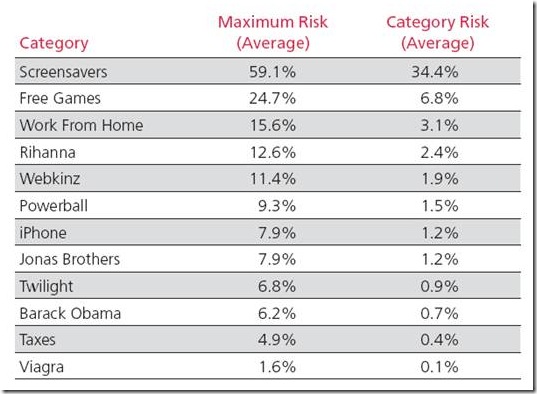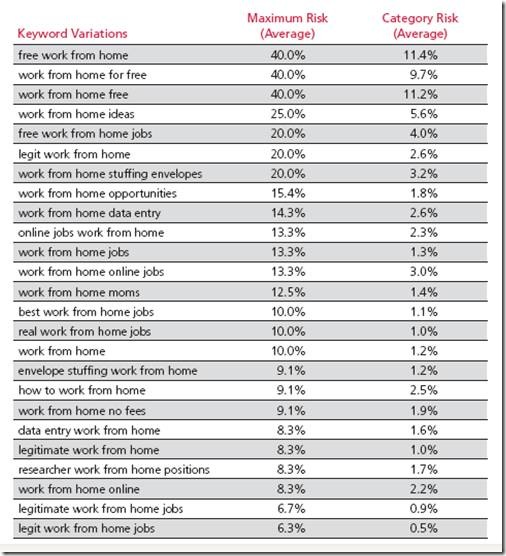 McAfee recently released a report on The Web’s Most Dangerous Search Terms. The report describes how cybercriminals are making the most of the popular search terms online, and entice searchers to download files carrying malicious software, as a result, exposing their personal and financial data.
McAfee recently released a report on The Web’s Most Dangerous Search Terms. The report describes how cybercriminals are making the most of the popular search terms online, and entice searchers to download files carrying malicious software, as a result, exposing their personal and financial data.
The reports also indicate that with the economic slowdown, malicious search results have risen, as the number of hits on free products, work from home options, etc. have increased.
Topping the list of some of the most high-risk searches on the Web today is “Screensavers” with a maximum risk of 59.1%. “Lyrics” and anything that includes “free” has the highest risk percentage of exposing the users to fraudulent websites and malicious software.
Statistics
McAfee searched for more than 2,600 popular keywords and more than 413,000 unique URLs (web addresses). Here are some highlights of the report:
- The categories with the worst maximum risk profile were lyrics keywords (26.3%) and phrases that include the word “free” (21.3%). If a consumer landed at the riskiest search page for a typical lyrics search, one of four results would be risky.
- The categories with the safest risk profile were health-related search terms and searches concerning the recent economic crisis.
- The riskiest set of keyword variations was “screensavers” with a maximum risk of 59.1% and an average risk of 34.4%.
- Surprisingly, searches using the keyword “Viagra,” a popular keyword that is a frequent “visitor” in our spam filters, yielded the fewest risky sites.
- Keywords popular in non-US countries were significantly riskier than those popular in the United States. 14 countries had keyword lists that exposed users to a higher maximum risk than average, including the Czech Republic (14.2%) and Brazil (12.1%). And 12 countries were overall riskier than the average, including Mexico (1.9%) and India (1.8%).

Work from home scams
The chance to make good money while you “work from home” lures many people. And with the economic slowdown, and with many people losing their jobs, people end up giving these scams a try, which is a huge gamble. Work from home searches can be as much as four times more risky than the average for all popular terms. And on average, these searches are 50% more risky than other popular terms.

So what have you been searching for online lately? Unfortunately, today, mere reliance on intuition or knowledge of past risks is not enough to stay safe on the web. Even technically sophisticated users are at risk. It is very important to have security suite installed on your PC and use safe search tools. Let’s be extra careful!
Link: McAfee report
10 Comments
nice, post swati..
cyber criminal always in search of something valuable. and work from home free and these keywords are on high risk category.
even screensavers is very risky.
so, it is highly important to keep safe your passwords and other informations.
@rahul: I agree with you there. Better safe today than sorry later.
free screensavers are always a threat ,PC users will search for screensavers and download them, actually they are inviting malwares into their systems.
@venkat: True. One reason why I am always apprehensive about downloading screensavers, and tell others not to do so either. Thanks for sharing your views.
People are tempted to get stuffs for free on the internet and in real when they hear that something is free they just jump in.
@IPO: Correct, Anything free online happens to get maximum attention by people in general. Perhaps that’s the reason why spammers take advantage of that fact. Thanks for sharing your views.
Awesome post! yeah it’s true many people looking for free stuff nowadayz then what’s better than net that’s why because of these free stuffs they also got virus,worms .Hackerz alwayz looking around for these mistakes doing by us.
@niitian: Thanks for sharing your views. Cybercriminals also using world news and events to their advantage, like we have seen in the recent past. More so, they are becoming multi-lingual by using automated translation services to enable multiple language spam runs. It’s a scary world out there.
How can you bypass getting caught up with these cybercriminals? I may need to upgrade the security system on my computer and buy some of the latest technology online to protect me from viruses, worms, and hackers.